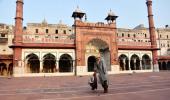'The new Waqf bill sows the seed for conflict in every town and village of India.'
 <
<
The Waqf (Amendment) Bill was passed by Parliament this week.
But the battlelines between the National Democratic Alliance government and the Opposition over the legislation remain as active as ever.
While the government asserts that the Bill will benefit Muslims, the Opposition stated in Parliament that the legislation was one more step by Prime Minister Narendra Modi to weaken the Muslim community.
'The Waqf bill was meant to Dilute, Defame, Divide and Disenfranchise Indian Muslims,' declared Congress MP Gaurav Gogoi.
So what is the truth? Is the Waqf Bill as bad as the Opposition states it is, or as good as the government declares it is?
To find out, Syed Firdaus Ashraf/Rediff.com spoke to Shahid Siddiqui, a well-known face in Indian politics and respected chief editor of Nai Dunia, an Urdu weekly newspaper.
Is the Waqf Bill passed in Parliament for the betterment and upliftment of Muslims, as the government states, or is it, as the Opposition says, a negative development?
First of all, let me explain what are Waqf properties.
Are these Waqf properties shopping malls? Are they houses or buildings? The answer is no.
So the question arises, what are these Waqf properties? The answer is, 90 percent of these Waqf properties are dargahs (shrines), graveyards and mosques.
The revenue of these properties is only around Rs 150 crore (vis a vis the size of the land bank with the Waqf, which is very huge).
(The revenue is less) because you cannot get rent income from mosques, graveyards and dargahs. In fact, you have to spend more on maintaining them.
People think that Waqf means some property holding (institution) but the fact is it is a religious institution.
When anybody donates his or her property to Waqf it means h/she gives it for ensuring the path to Allah. Now Allah becomes the owner of the property. This property can be used for building a mosque or graveyard.
Now, under the present rules the government can take over any Waqf property if they do not register it within six months. And by chance if a single paper is missing for these Waqf properties, the government can take control of that property as they will eventually fail to register it in six months because of lack of proper documentation.
This means there is a threat to every dargah and mosque in the country because Waqf property land on which mosques, dargahs and graveyards are located goes back to 200 or even 500 years ago.
Some documents might be there but then in these cases the documents are written in Persian and Arabic and that needs to be translated into English, Hindi or other regional languages.
This will be a very tedious process as a result of which the majority of Muslim dargahs and mosques (in existence) will be threatened.
The new Waqf bill sows the seed for conflict in every town and village of India.

Some maulanas say they will not accept the new Waqf bill. Do they have a choice considering that Parliament has passed the bill? What can they do by opposing it when it will soon be a law?
Forget maulanas, the new Waqf bill is against the Constitution of India. The Muslims of India and a large number of Hindus do not accept it.
The Tamil Nadu assembly has passed a resolution rejecting the new Waqf bill.
80 percent of Opposition parties who are not in power have not accepted the new Waqf bill so why talk only of maulanas?
The Bharatiya Janata Party says Muslims have been misled by the Opposition on Waqf.
This narrative is a media creation. I did not hear any maulana stating that he is accepting the new Waqf bill.
Just because some bearded chap comes on television debates and expresses his opinion on Waqf, that does not mean he is a maulana. The idea behind the new Waqf bill is vote bank politics.
The government wants to send a message to a section of their voters, 'dekho Musalmano ko sabak sikha diya (we have taught Muslims a lesson).'
Does it mean the new Waqf bill is a Hindu appeasement bill?
Don't say Hindu appeasement, but call it an appeasement policy for BJP followers.
This Waqf bill is not appeasing Hindus because if they were providing jobs to Hindus then I could believe that, but in this case they are playing with the sentiments of a section of Hindus. I repeat a section of Hindus as a majority of Hindus are not with the BJP.
The BJP is creating fear by continuously raising such issues. This is a very dangerous trend for any country's future.
Is the bill a violation of Article 14 which speaks of equality?
Yes, the new bill is in violation to Indian Constitutional values.
Hindus can maintain their own places of worship, but Muslims cannot.
Under this new Waqf bill the administration of Waqf properties will be with the Government of India.
Take, for example, the Vaishno Devi temple in Jammu, if the district magistrate of that place happens to be a Muslim, he cannot be on the board of Vaishno Devi. It is clearly written in the law.
But tomorrow you can have non-Muslims who are Bajrang Dal or Vishwa Hindu Parishad members becoming Waqf board or Waqf council members. The government has the freedom to do that and they can create havoc.
Do you seriously believe that VHP and Bajrang Dal members can be on Waqf boards in the future? Is it even possible?
Yes, it is possible. VHP and Bajrang Dal members can sit on the Waqf board in future. Nobody can stop the government from appointing anybody on the Waqf board.
What about Muslim members who will be appointed according to the new Waqf bill? Who can the government appoint?
They have to be practising Islam for five years. How many times do you pray in a day? Did you do morning namaaz or evening namaaz? This new Waqf bill is a joke which has unfortunately been passed.











 © 2025
© 2025